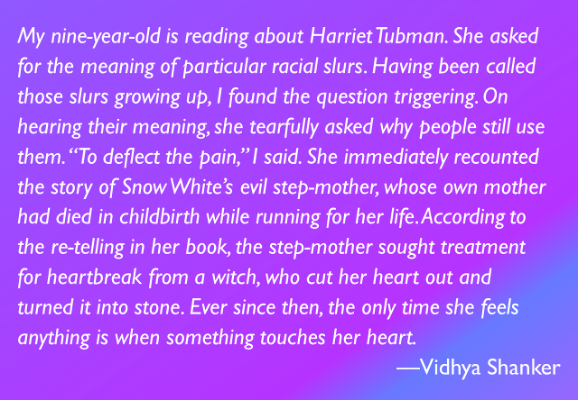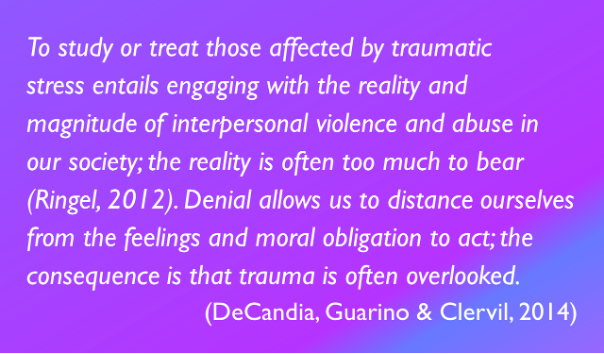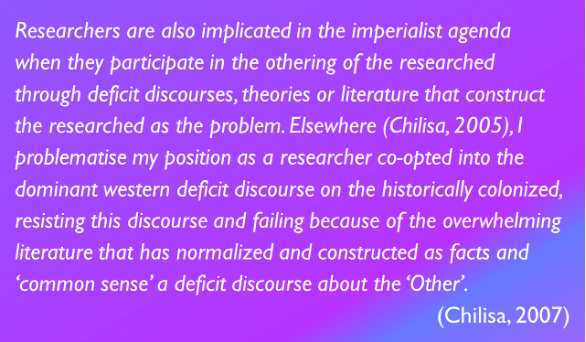We are Allison Shurilla, independent evaluation consultant, and Dr. Vidhya Shanker, independent evaluator and scholar. Collaborating on this blog has allowed us to identify how we are already related—through our shared connection to feminist evaluation—constituting a potentially healing act.
As evaluators start recognizing the importance of understanding our own cultural and institutional power dynamics in relation to those of the individuals and communities we work with, knowledge of trauma and healing can help us develop an evaluation practice that begins to repair the damage that evaluation and the industries that use it continue to inflict upon the global majority—including members of the global majority within evaluation and surrounding industries.

Trauma-Informed Practice
Trauma-informed practice recognizes trauma inflicted on individuals as well as societal and intergenerational trauma. Acknowledging that trauma is pervasive, it emphasizes safety, agency, and relationship-building. It asks, “what happened to you?” rather than, “what is wrong with you?” Incorporating this understanding into our practice helps evaluators not only conduct better evaluations, but also engage more respectfully and compassionately with everyone we work with.
Focusing on trauma, however, can otherize victims/survivors of interpersonal, structural, and intergenerational violence. It risks locating trauma in “them” and positioning “us” as redeemers somehow outside the ecology that produced the trauma to begin with.

Healing Centered Engagement
Healing-centered engagement—a phrase originating in U.S. communities of color and indigenous communities—resists defining people by the trauma they have experienced or offering it for others’ consumption. Beyond clinical or ecological, it is explicitly political. Viewing trauma not as an individualized, discrete incident—particularly for the global majority—it reorients the gaze from victims/survivors to the healing that happens relationally and that we are collectively responsible for. It is affirming, culturally-rooted, critically reflexive, and restorative for healer and healed. If trauma-informed practice asks, “what happened to you?,” healing-centered practice asks, “how have we—our community and ancestors—survived and transformed what is happening to us?”

Feminism
Like feminism, trauma-informed and healing-centered approaches problematize violence and abuse, which are normatized through their pervasiveness and recurrence. They value caring labor and incorporate notions of relationality and reflexivity, which acknowledge the evaluator as an interested party in the problem, solution, and evaluation.
Trauma is not something evaluators should ask about directly without sufficient support or training, but it is something we should plan for. Moreover, evaluators can generate healing through our practice by acknowledging our own woundedness and positionality. We can flip scripts that re-inscribe well-worn, racialized patterns of domination (evaluator as expert) and subordination (evaluands, program participants, victims/survivors) and articulate “how we are in relation with the contexts we study and with our informants.”
Rad Resources:
- Martha Brown offers a course on becoming trauma informed
- Trauma-Informed Evaluation: Tip Sheet for Collecting Information offers trauma-informed techniques for evaluation
- AEA Conference Session Number 1622: Doing No Harm in Evaluation includes insight from African relational ethics—rather than a duty of care—gained from research Vidhya Shanker and Antony Maikuri conducted with inspiration from Joan LaFrance
- Why am I Always Being Researched? questions the otherizing gaze
The American Evaluation Association is celebrating Feminist Issues in Evaluation (FIE) TIG Week with our colleagues in the FIE Topical Interest Group. The contributions all this week to aea365 come from our FIE TIG members. Do you have questions, concerns, kudos, or content to extend this aea365 contribution? Please add them in the comments section for this post on the aea365 webpage so that we may enrich our community of practice. Would you like to submit an aea365 Tip? Please send a note of interest to aea365@eval.org. aea365 is sponsored by the American Evaluation Association and provides a Tip-a-Day by and for evaluators.

This is my second attempt at sending this comment so forgive me if it shows up twice:
Thanks for your comments, Elizabeth!
Carol Weiss was definitely ahead of her time, and she, Lois Ellin Datta, and Marcia Guttenberg were the three women who actually started what became AEA, not that that’s recognized the way it should be.
I will only add that members of dominant/ dominating groups are dealing with trauma, too–the trauma of being disconnected from the truth and from history, of hiding and papering over the guilt of their/ our ancestors, of being disconnected from their/ our indigenous cultures and spiritual traditions, the earth, their/ our bodies. I believe that much of the harm that continues to be inflicted by those in power arises from unresolved trauma and the desire to distance themselves/ ourselves even further from painful truths that those of us suffering oppression remind everyone of just by living, but especially by practicing our culture/ spirituality and living our values/ walking our talk.
I hope the gaze can shift from being focused on those who are surviving harm to those who have inflicted and continue to inflict harm–which of course is fluid and contextual.
Thanks again,
Vidhya
Hi Allison and Vidhya,
I was really moved by your insights on recognizing the power dynamics involved in evaluation, especially when working with people of the global majority. I am new to evaluation, but I’ve worked in education for over a decade. I am taking a program evaluation course for my graduate degree and my learning through the course has been very rich, but I am also looking for advice on how best to work with people of the global majority in a respectful and empathetic way. I felt that the advice you gave was helpful for both my role in education and as an evaluator.
A lot of my work is with Indigenous communities and the intergenerational trauma that is present in their lives. I agree that approaching evaluation with a focus on healing rather than trauma is best, especially if we do not have a personal understanding of that trauma because we are then coming into the situation from a place of privilege, thus creating an imbalance in the power dynamics. I think this is also why I am drawn to research on the collaborative approach to evaluation. In Indigenous communities, there is an understanding that everyone works together to create solutions to problems and I too feel that this is the best way to teach and conduct an evaluation. Carol Weiss has been making this recommendation about evaluation for decades. She stated, “clients in the evaluative process would also help redress the inequalities in access to influence and the imbalance of the power that beset marginalized groups in their social interactions with the larger society,” (1988). In the end, evaluation is about improving programs and helping to create positive change, so focusing on the healing of the people that our evaluations will affect the most should definitely be our focus.
Thank you so much for using your expertise to educate others and applying such a compassionate and empathetic approach to your work.
Kind regards,
Elizabeth
Weiss, C. H. (1998). Have We Learned Anything New About the Use of Evaluation? The American Journal of Evaluation, 19(1), 21–33. https://doi.org/10.1016/S1098-2140(99)80178-7